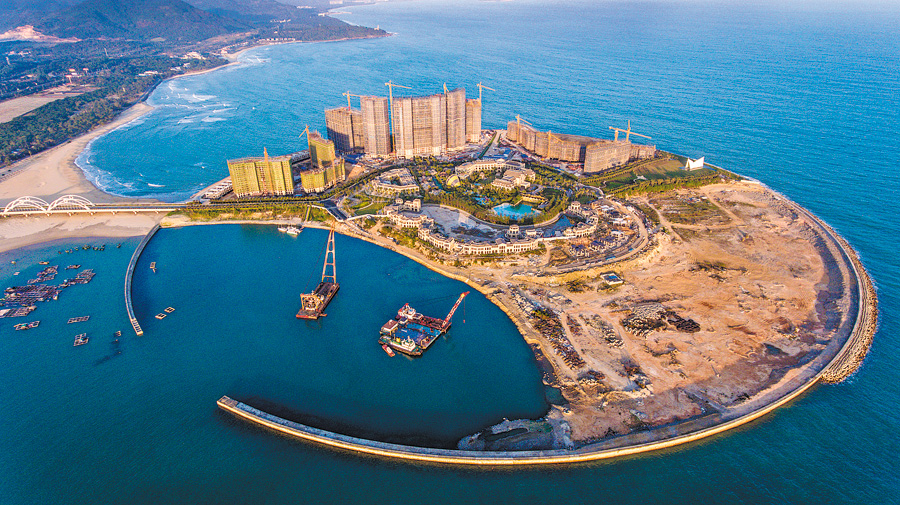
Reclaiming land to be restricted
 Construction of a resort project at Riyue Bay, or Sun Moon Bay, in Wanning, Hainan province, has been halted. The Sun Moon Island project covers a reclamation area of 97 hectares, and construction on Moon Island, 49.1 hectares, began without proper permits. LUO YUNFEI / CHINA NEWS SERVICE
Construction of a resort project at Riyue Bay, or Sun Moon Bay, in Wanning, Hainan province, has been halted. The Sun Moon Island project covers a reclamation area of 97 hectares, and construction on Moon Island, 49.1 hectares, began without proper permits. LUO YUNFEI / CHINA NEWS SERVICE
Business-motivated conversion of marine areas will be prohibited
China will halt and prohibit all business-oriented land reclamation activities and abolish local governments' authority over the matter in the strictest-ever control over reclamation, according to the State Oceanic Administration.
Lin Shanqing, deputy director of the administration, said on Wednesday that the government will nationalize reclaimed land with no structures built on it and will halt reclamation projects that have yet to be opened and are against national policies.
The central government will stop approving property development plans based on land reclamation and will prohibit all reclamation activities unless they pertain to national key infrastructure, public welfare or national defense, he said, adding that local authorities will no longer have the power to approve reclamation projects.
All structures that are built on illegally reclaimed land and that have seriously damaged the marine environment will be demolished, Lin added.
He said the government will tighten review and inspection procedures on applications for reclamation and other uses of the sea.
Gu Wu, head of the administration's National Marine Inspection Office, said that in the past, land reclamation, to a certain extent, helped to boost economic development by mitigating the land shortage in coastal regions and providing space for public infrastructure and industry parks.
However, illegal and irregular reclamation activities caused a number of problems to marine ecosystems and lawful businesses, she said.
Gu said that those effects have become a major public concern, so the administration decided that reclamation would be closely looked at in its annual inspection last year.
Four coastal provinces — Liaoning, Hebei, Jiangsu, Fujian — as well as the Guangxi Zhuang autonomous region and the island province of Hainan were subject to reclamation inspections in 2017.
Inspectors from the administration talked with 53 provincial leaders, handled nearly 1,200 complaints, and mobilized aircraft, drones, ships and satellites to examine reclamation projects.
Enterprises were fined a total of 1.24 billion yuan ($192.7 million) for irregular or illegal reclamation or other misconduct. Twenty-two local officials and company employees were held accountable, according to the administration.
Ke Chang, head of the administration's Environmental Protection Department, said the central government has been striving to reduce the area of reclaimed land since 2013, when 154 square kilometers of sea area was reclaimed. The past four years saw an average annual decrease of 22 percent in reclaimed areas. In 2017, about 58 sq km was turned into dry land, he said.
The government has also spared no effort to restore coastal environments and island ecosystems, according to Ke.
He said 260 km of coastline, 52 islands, 41 sq km of coastal wetland and more than 12 sq km of beach have been rehabilitated since 2011. In the next three years, the government will restore the ecosystems of at least 66 bays, 50 islands, 2,000 km of coastline and 180 sq km of wetlands, Ke said.
